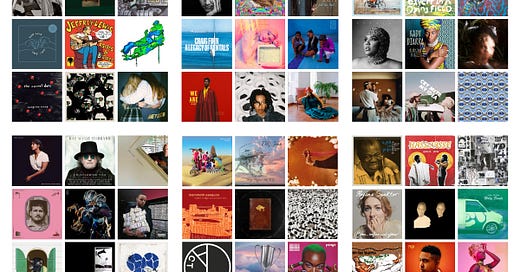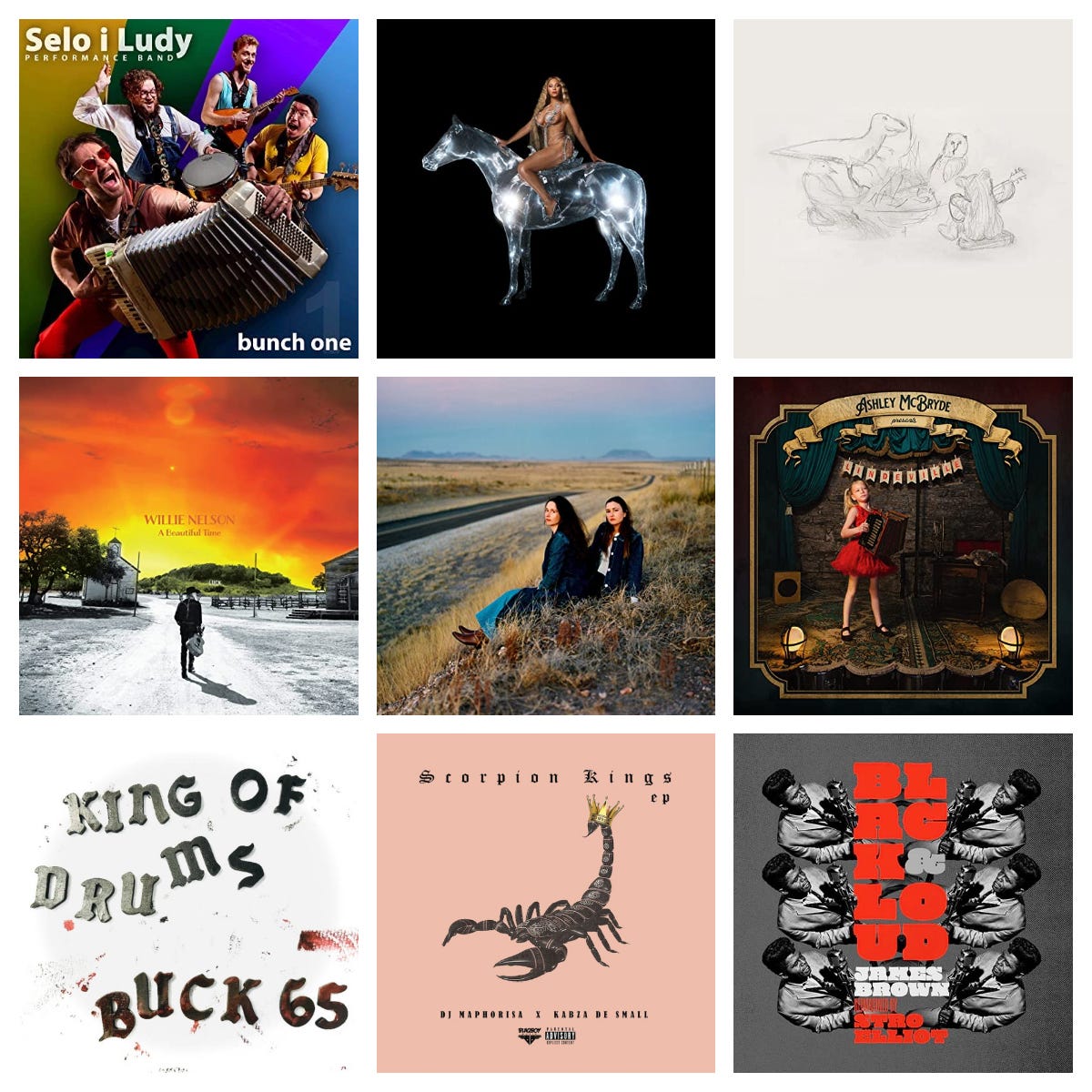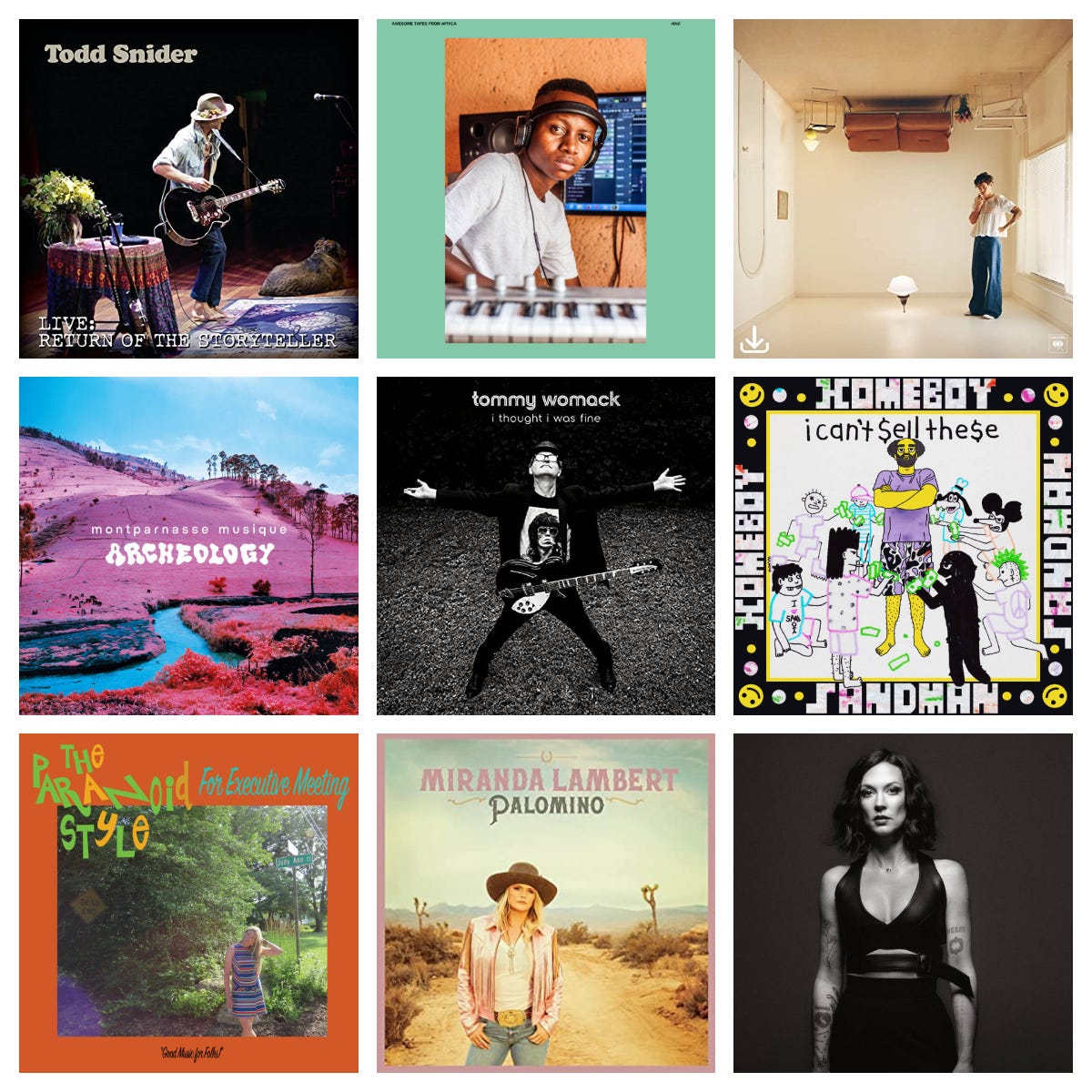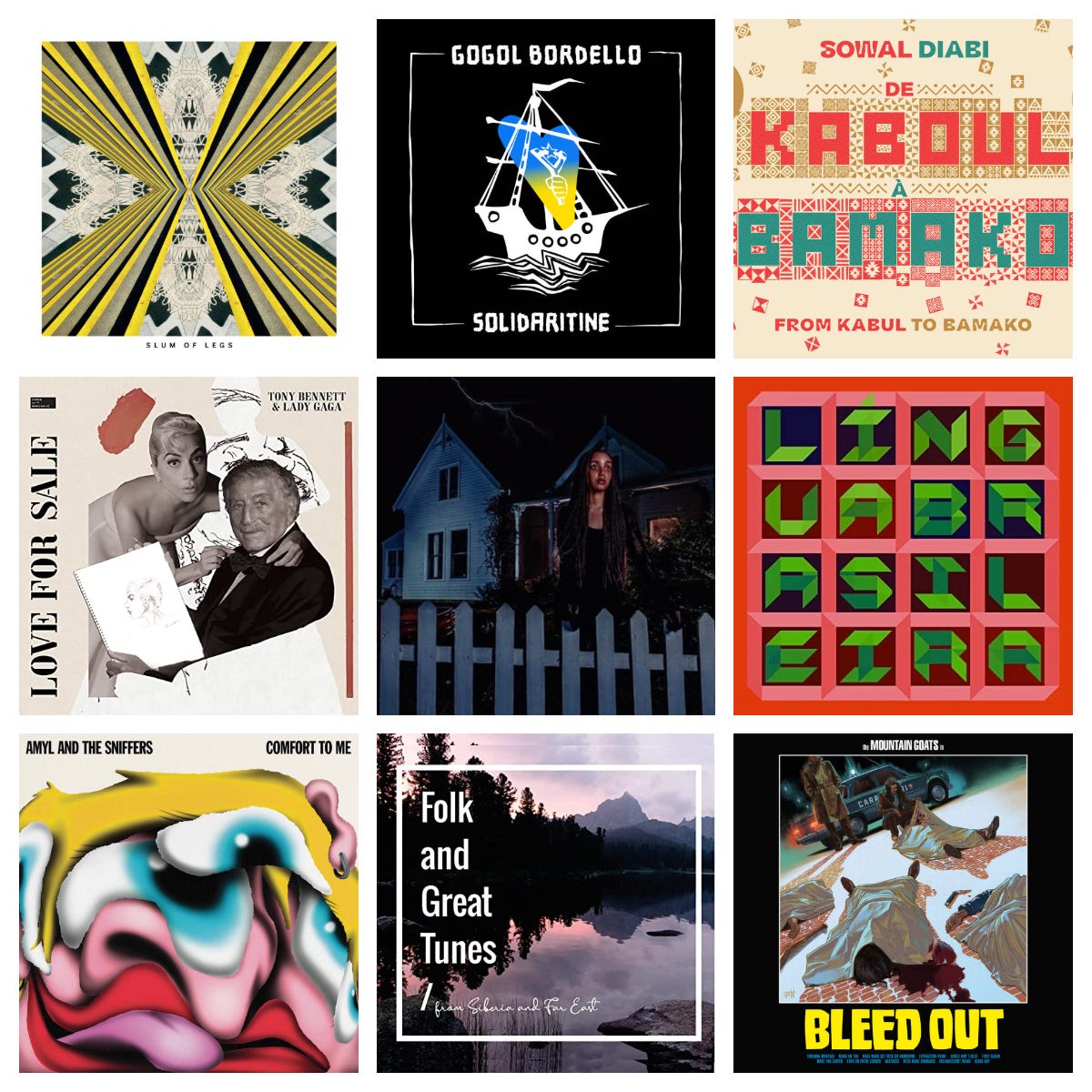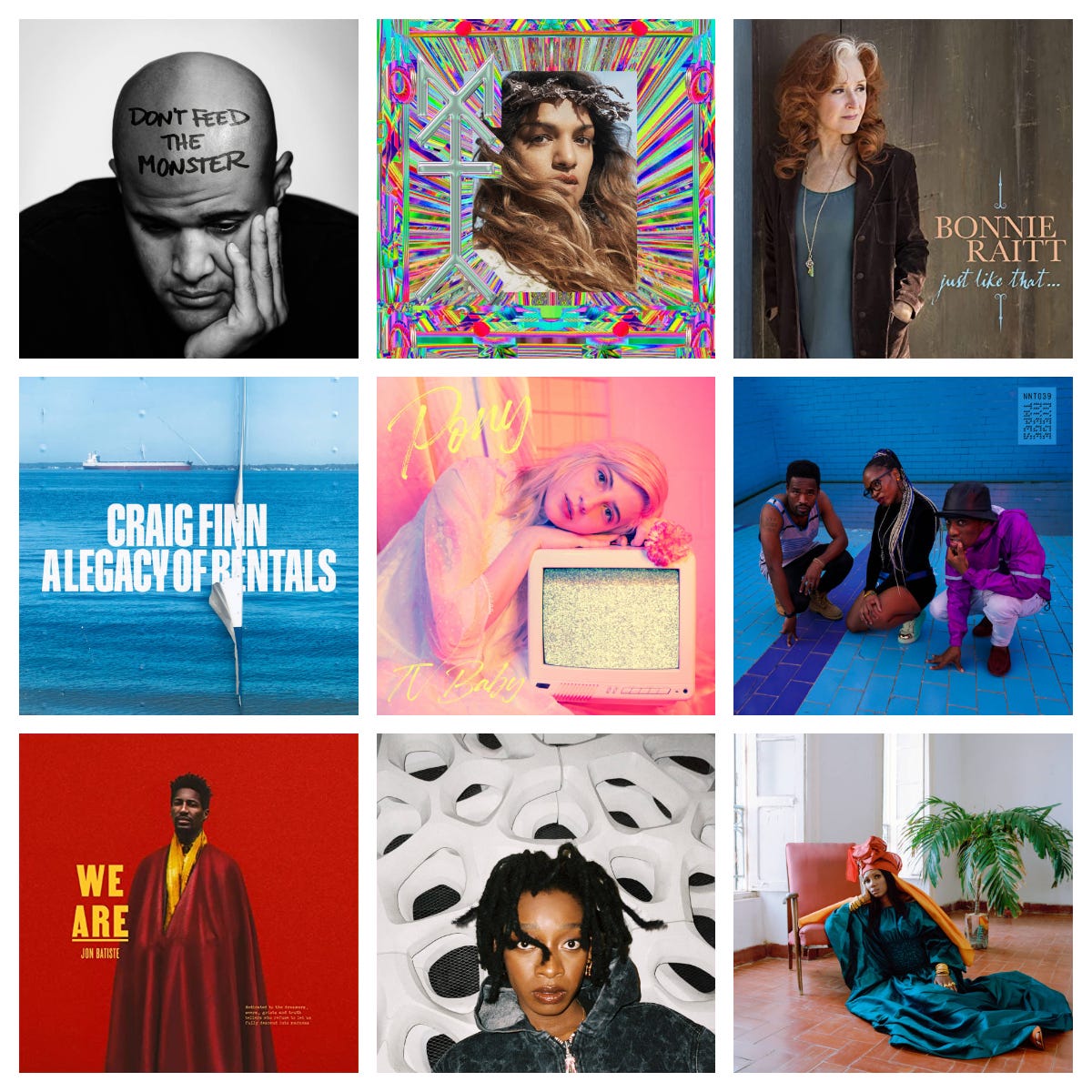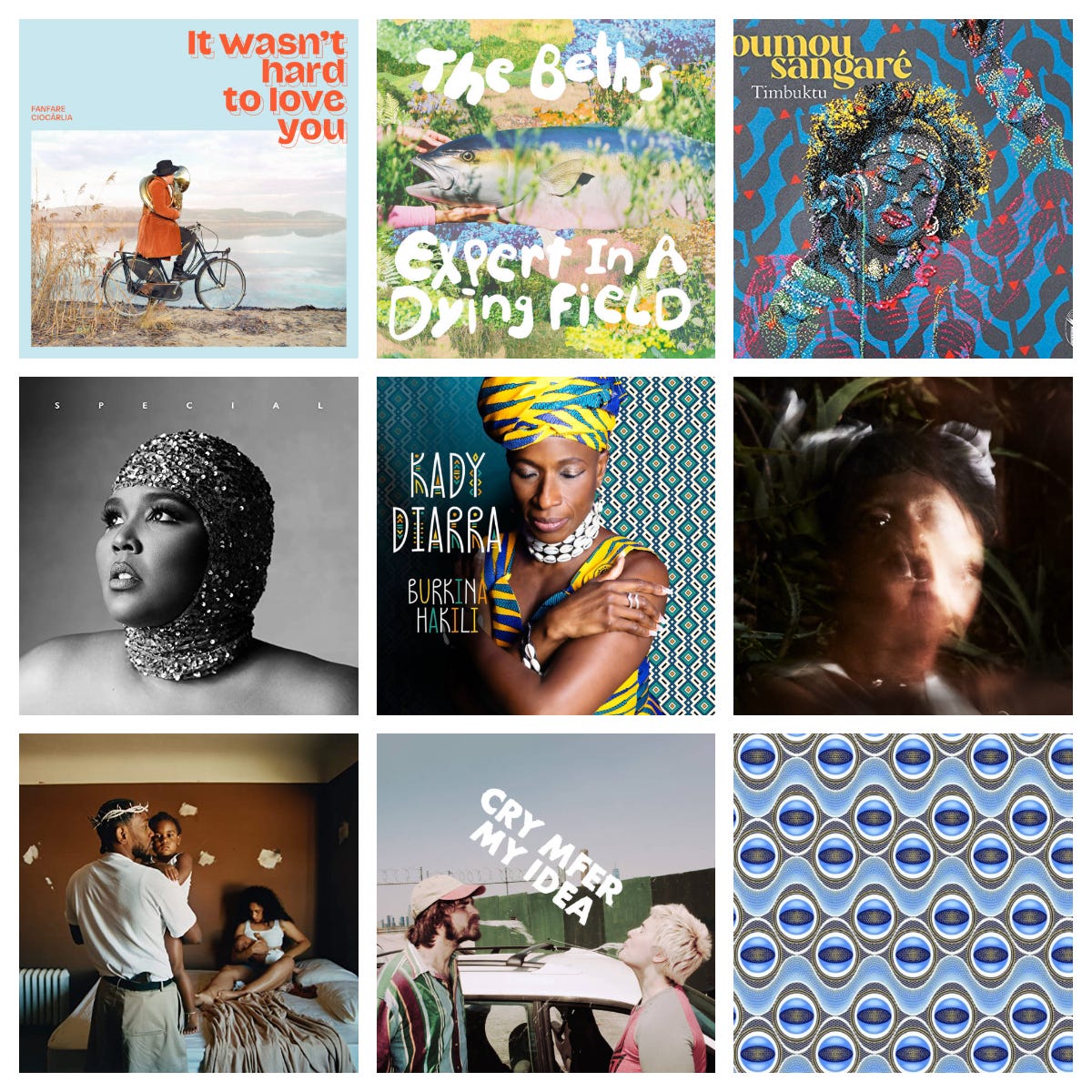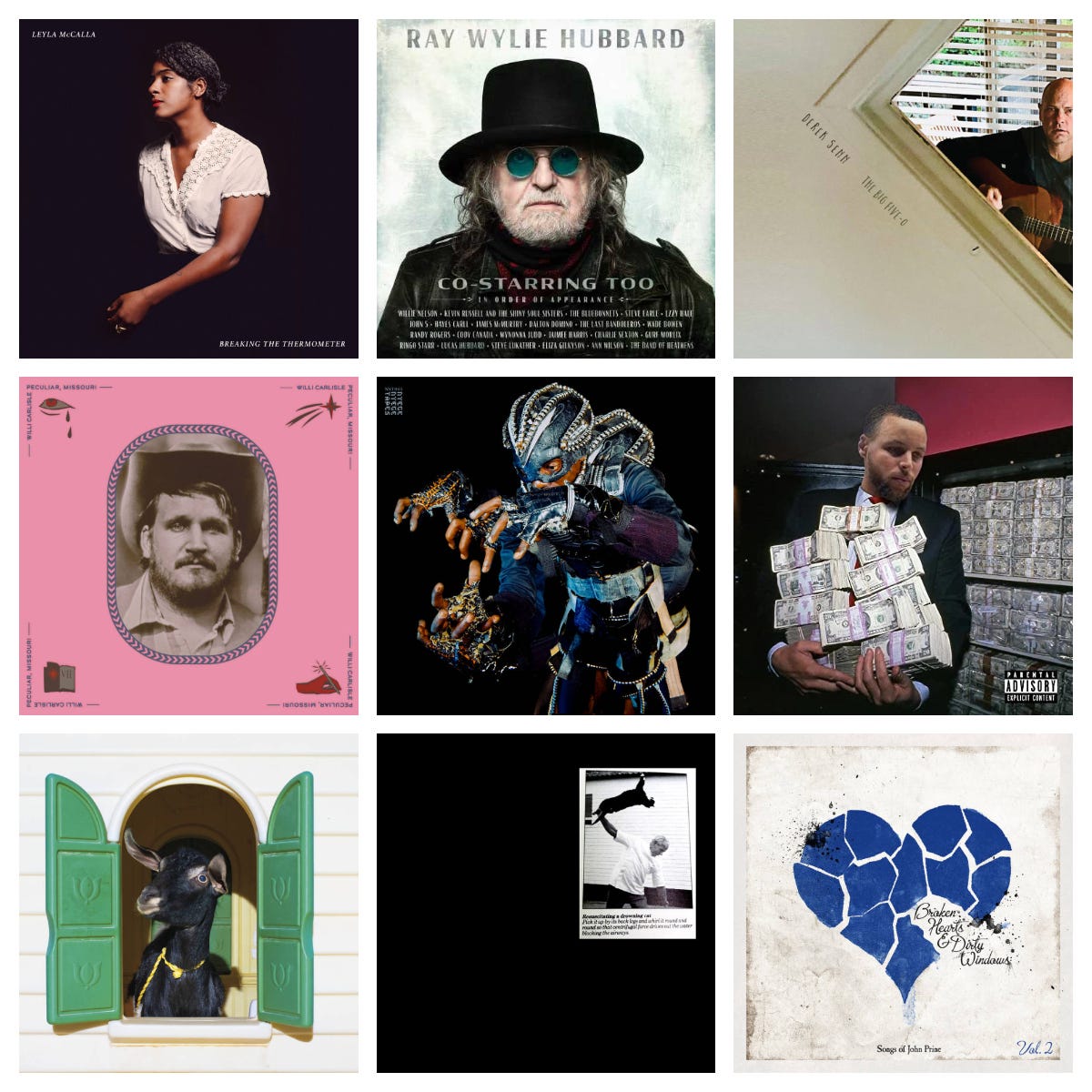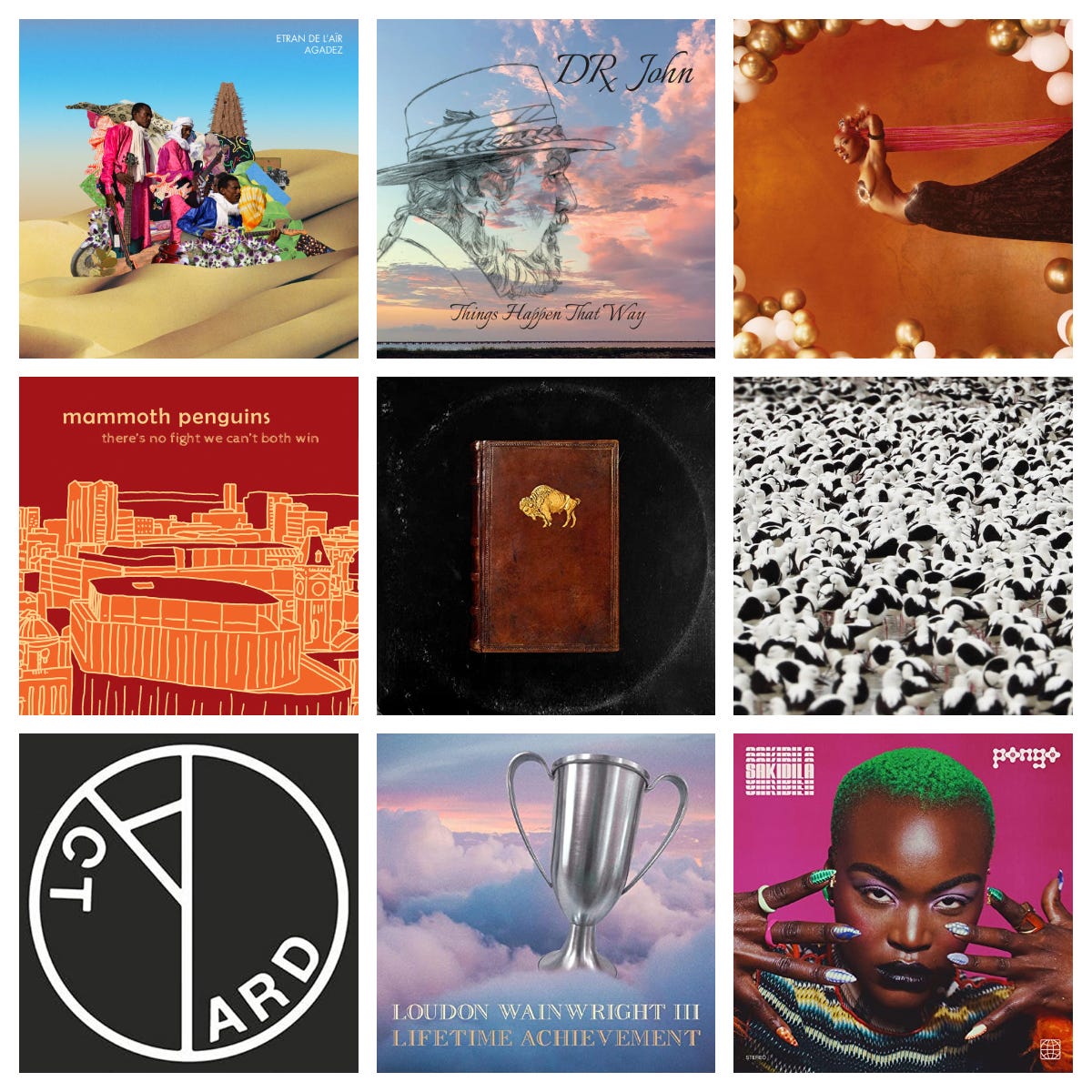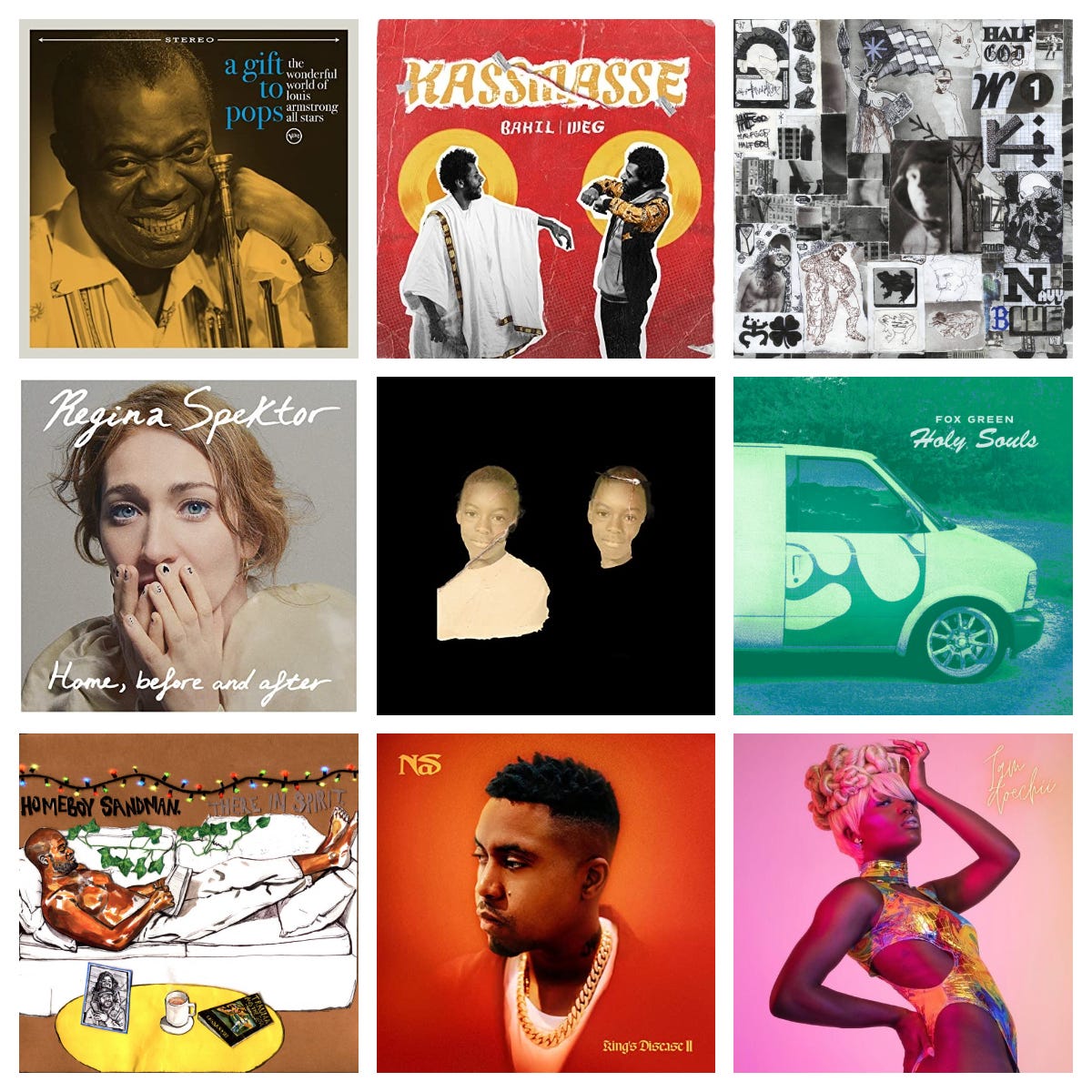Back in 2017, when 90 albums made the cut, I would have hoped that my lengthiest Dean’s List since then—this year’s checks in at 86 A records in the wake of 2021’s 71, 2020’s 71, 2019’s 76, and 2018’s 83—would signal a flowering of aesthetic comity in the anxiety-prone little world of rock criticism. But from my perch in this world, that’s not how it looks. In April I joined 83-year-old Robert Hilburn to became the second active rockcrit to turn 80 since the pioneering Jane Scott rounded that corner in 1999. And though it would be braggadocious-and-a-half to claim I remain young at heart, I still bear down on current albums and EPs: 168 every year in 12 Consumer Guides comprising nine A or occasional near-miss B plus albums and five Honorable Mentions granted three, two, or one stars. And as I began the job in 2022 it looked like a darn good year—until I checked out the dialectical year-end lists at the ever-evolving post-counterculture bulwark Rolling Stone and Pitchfork, a onetime bastion of fanboy dumbass that in the late ‘00s was changed utterly by a phalanx of women critics whose feminism was so righteous and overdue it remained in the mag’s DNA after they moved on to the bigger jobs they deserved. And for completeness’s sake I also looked over the Top 100 assembled by PopMatters, which has been pumping out competent-plus music-movies-TV-etc. coverage since 1999.
As the guy who for 30-some years oversaw the Pazz & Jop Critics' Poll he devised for the Village Voice in 1971 or 1974, I was aware of two other salient options: the news-and-reviews site Album of the Year’s Year End Aggregate count of 127 publications’ annual best-albums lists and the freewheeling Pazz & Jop Rip-Off Poll that staked its ornery claim a few years ago on Facebook. But as a professional journalist since 1964, I do retain a fondness for the increasingly chimerical notion of publications—now predominantly web-based I know, aware that I’ve lost that battle even if five households in my 16-unit building still get the newsprint New York Times delivered—that pay living human beings to write column inches of critical prose that other human beings may well read! That’s because the people who choose to do this work are experts of a sort; their consensus is informed even if in the end it adds up to nothing more than a rogue species of conventional wisdom. For decades I wrote annual essays that among other things picked holes in this kind of consensus. But that doesn’t mean I don’t always find them enlightening even when partial or fallacious. Hence the Dean’s List roundup that’s been a January feature at And It Don't Stop since 2020.
But as I was starting to say, the critical comity I wish I could celebrate at this fraught historical juncture has not been forthcoming. A few long-players have indeed inspired something like universal acclaim, none more so than the hands-down album of the year, Beyoncé’s dance-r&b summum Renaissance, which I made my number two for the simple reason that a 2019 effort by an accordion-led Ukrainian rock-oldies band touched me even deeper. Rather too predictably, Pulitzer Prize rapper Kendrick Lamar’s candidly confused confrontations with “lust addiction” and exhibitionist materialism on Mr. Morale and the Big Steppers were accounted profound by journos who know nothing about the latter and probably not much about the former either. In indie-rock few could resist my number three, Album of the Year’s number five, Pitchfork’s number seven, and Rolling Stone’s, well, number 35 (“Adrianne Lenker’s voice may be an acquired taste,” postulated Will Hermes, which could also be said of Billie Holiday’s): Big Thief’s Grammy-nominated two-CD Dragon New Warm Mountain I Believe in You. The Spanish pop experimentalist Rosalía’s five-years-in-the-waiting third album Motomami was top 10 in both Rolling Stone and Pitchfork and finished second albeit well behind Beyoncé in Album of the Year’s compendium. Less propitiously I’d say, Molly Rankin’s Alvvays broke into top-level alt-pop renown with Blue Rev, as I hear it the muddiest of the three albums they’ve eked out since 2014, and I have simular quibbles with the more prolific Irish post-punks of Fontaines D.C., who I suspect gained critical cachet on sheer stick-to-itiveness with Skinty Fia, their third and dullest album since they got going in 2019.
Sadly, these moments of fellow feeling have been getting rarer in a journalistic byway awash in both subject matter and competition—a world where anybody with what are said to be basic computer skills can aim their recorded music at a theoretically vast audience and some word-slinger with even sketchier computer skills can critique it for a smaller one. So with even Billboard risking critical-by-omission year-end lists, you know these online periodicals are: say hi to the long-running Stereogum (Lamar ranked 20, Big Thief 8, Beyoncé 3, Rosalía 2, and Alvvays 1), the sports-plus The Ringer (Big Thief ranked 23, Lamar 8, Alvvays 5, Rosalía 2, and Beyoncé 1), and I beg your leave to leave it at that as I cast my generalizing net. That’s because I see two patterns or tendencies in these names and numbers and their surrounding listicles—one obvious and indeed statistical and the other subtler and indeed speculative.
The obvious one is generational. Going down my Dean’s List from top to bottom, I have constructed a more specialized list of 18 artists plus their ages as of January 1: Willie Nelson 89, Buck 65 50, Todd Snider 56, Tommy Womack 54, Gogol Bordello featuring Eugene Hutz 50, Tony Bennett 96, Tom Zé 86, the Mountain Goats featuring John Darnielle 55, the Drive-By Truckers featuring Patterson Hood 58, Bonnie Raitt 73, Craig Finn 51, Oumou Sangaré 54, Ray Wylie Hubbard 76, Derek Senn 50 (album title: The Big Five-0), Superchunk featuring Mac McCaughan 55, Dr. John deceased at 77 in 2019 with album recorded not long before, Mary J. Blige 51, Fimber Bravo 7?/8?? (In addition, I note for the record that M.I.A. has somehow turned 48 and, can’t resist, Beyoncé is 41). If memory serves, and I admit mine ain’t what it used to be, the only one of these acts to show up on any of the lists I’ve been batting to and fro, including free-at-last post-lockdown fare by the Drive-By Truckers, the Mountain Goats, and Superchunk, is proud formalists Spoon featuring Britt Daniel 51.
The subtler pattern isn't merely speculative—it’s both general and loaded with details that, especially in Pitchfork’s case, often requires me to generalize about music I have limited knowledge of or feel for. And in both it’s about journalistic branding, which whatever my misgivings about these mags I don’t mean belittlingly, because I respect both enough to believe that for the most part they care about what they claim to care about. So let’s posit that with the myth of the rock-inflected counterculture having deteriorated into a boomer joke with diminishing revenue potential, Rolling Stone has taken a demographic leap that honors its left-liberal history by embracing the multiculturalism of immigrants who were nowhere near as prominent in the U.S. when the mag got started over half a century ago—Spanish-speaking especially of course, but also Korean K-pop, African Afrobeat and hip-hop, and were Americans to succeed in squelching the border crackdowns nativist fascists demand, other not-actually-esoteric hybrids before too long.
Pitchfork takes a rather different tack. Without dismissing immigrant strands, it focuses on the formally rather than culturally esoteric, with a feminist slant that would make the fanboys who dominated the mag’s youth gossip in the men’s room. Not only are more than half the artists in its 2022 top 50 women, but these women tend highly impressionist and experimental. And in its just-published “25 New and Rising Artists Shaping the Future of Music in 2023,” white men are shut out to a demographically unlikely degree—added to Anglo-Armenian producer Hagop Tchaparaian, a few male helpmates, and perhaps the militantly anonymous U.K. electro duo Two Shell is just one white mostly male although mixed-gender alt-rock entity, Asheville’s Wednesday. For reasons that include demographic peculiarities of my own, it’s been decades since I made the merest pass at predicting “the future of music,” and I have no desire to spoil that record here. But there are way too many white guys left in the world for their musical “future” to be quite that scant. And for demographic reasons baldly apparent in the over-50 roll call above, I don’t think their musical present gets enough respect.
Without adducing my 55-year track record in these fraught matters, which is somewhat better than that of most rock critics, I’ll offer a simple race-and-gender breakdown of the 2022 Dean’s List: neatly if coincidentally, I’ve named 38 Black artists and 38 female artists, 16 of them both. After adding that among the boths are three U.K.-based vocalists, I should also announce that all arithmetical challenges will be speedily deleted from my computer and my recall memory—adding this stuff up is hard, with minor errors and categorical quibbles inevitable. I should also note that as one of the few rockcrits to cover African music extensively, although not (yet) in its modern Afrobeats-as-opposed-to-Afrobeat variants (although, oy, here comes South African amapiano und so weiter), my Black-white breakdowns get a boost almost every year—very few rock critics or for that matter African-American listeners with pre-Civil War roots, although somewhat more these days, pay much attention to mbalax, mbaqanga, soukous, chimurenga, or even, oy, amapiano. Most of which, I’ll append for transition’s sake, share two simple musical characteristics I’ve cared about since Fats Domino’s “Ain’t That a Shame” and Chuck Berry’s “Maybellene,” top 10 radio hits from the late summer of 1955 that changed my life and, indirectly or not, the lives of every 50-and-over listed above. Both flaunted groove, hook, and for fun let’s spell it toon. Oo-oo-oo.
Although you can start if you like with Mamie Smith’s surprise 1920 smash “Crazy Blues,” I prefer to date the record industry—which generated the world of musical possibilty that made Rolling Stone, Pitchfork, and the Dean of American Rock Critics possible—to the dawn of electrical recording in 1925, just four-some years before the Great Depression changed everything again. It was the first hi-fi, and it made the “Jazz Age” with its cherished 78s possible. So now do the math. After just 30 years—on the other side of the Jazz Age and the Depression and the “swing era” and World War II and 45s too if you want—come Fats Domino and Chuck Berry kicking off a musical era that if you prefer to put it that way would change utterly again and again and then agains after that. But for someone who lived through the Beatles and arena-rock and disco and punk and hip-hop and techno and the befuddlements of the world-at-your-eardrums streaming “economy,” all that seems like kind of a stream itself—a wide one, a rushing one, a hard-to-navigate one. People in their twenties and thirties who still manage to earn a living in music journalism may well know the outlines of this history. But for them its oo-oo-oo is pretty abstract, while it’s anything but for the 17 50-and-overs whose music delighted me in 2022. And since 1955, when it all began, 67 years—not a piddling 30—have passed.
I don’t have anything like a clear notion of what will come of the rock-inflected multicultural pop future Rolling Stone hears in its collective head, although I have little doubt many of its favorites will be with us for quite a while. I’m just about certain that most of the future-shapers Pitchfork posits will do no such thing but also expect that some will make a serious mark and a few conceivably do more than that. But of one thing I’m sure. Some of the old hands who made this year’s Dean's List will die all too soon, as indeed may I—pass 80 and I guarantee those thoughts will visit you too. But a bunch of them are whippersnappers in their fifties. And more than not will live to oo-oo-oo again.
1. Selo i Ludy Performance Band: Bunch One (self-released ‘19)
2. Beyoncé: Renaissance (Parkwood Entertainment/Columbia)
3. Big Thief: Dragon New Warm Mountain I Believe in You (4AD)
4. Willie Nelson: A Beautiful Time (Legacy)
5. Plains: I Walked With You A Ways (Anti-)
6. Ashley McBryde: Lindeville (Warner Music Nashville)
7. Buck 65: King of Drums (Handsmade)
8. DJ Maphorisa X Kabza de Small: Scorpion Kings (BlaqBoy ‘19)
9. Stro Elliot & James Brown: Black & Loud: James Brown as Reimagined by Stro Elliot (Polydor)
10.Todd Snider: Live: Return of the Storyteller (Thirty Tigers/Aimless)
11. DJ Black Low: Uwami (Awesome Tapes From Africa)
12. Harry Styles: Harry’s House (Columbia)
13. Montparnasse Musique: Archeology (RealWorld)
14. Tommy Womack: I Thought I Was Fine (Schoolkids)
15. Homeboy Sandman: I Can’t Sell These (self-released)
16. The Paranoid Style: For Executive Meeting (Bar/None)
17. Miranda Lambert: Palomino (Vanner/RCA)
18. Amanda Shires: Take It Like a Man (ATO)
19. Slum of Legs: Slum of Legs (Splurge '20)
20. Gogol Bordello: Solidaritine (Cooking Vinyl/Casa Bordello)
21. Sowal Diabi: De Kaboul á Bamako (Accords Croisé)
22. Tony Bennett & Lady Gaga: Love for Sale (Columbia/Interscope ‘21)
23. PinkPantheress: To Hell With It (Parlophone ‘21)
24. Tom Zé: Lìngua Brasileira (Selo Sesc)
25. Amyl and the Sniffers: Comfort to Me (ATO ‘21)
26. Folk and Great Tunes From Siberia and Far East (CPI Music)
27. The Mountain Goats: Bleed Out (Merge)
28. My Idea: That’s My Idea (Hardly Art ‘21)
29. Mama’s Broke: Narrow Line (Free Dirt)
30. Drive-By Truckers: Welcome 2 Club XIII (ATO)
31. Terry Klein: Good Luck Take Care (Terry Klein Music)
32. Jeffrey Lewis: When That Really Old Cat Dies (Spotify/Amazon/Apple)
33. Emperor X: The Lakes of Zones B and C (Dreams of Field Recordings)
34. The Casual Dots: Sanguine Truth (Ixor Stix)
35. Danger Mouse & Black Thought: Cheat Codes (BMG)
36. Wet Leg: Wet Leg (Domino)
37. Homeboy Sandman: Don’t Feed the Monster (Mello Music Group ‘20)
38. M.I.A.: Mata (Island)
39. Bonnie Raitt: Just Like That . . . (Redwing)
40. Craig Finn: A Legacy of Rentals (Positive Jams/Thirty Tigers)
41. Pony: TV Baby (Take This to Heart ‘21)
42. Phelimuncasi: Ama Gogela (Nyege Nyege Tapes)
43. Jon Batiste: We Are (Verve ‘21)
44. Little Simz: No Thank You (Forever Living Originals/AWAL)
45. Rokia Koné & Jacknife Lee: Bamanan (RealWorld)
46. Fanfare Ciocarlia: It Wasn’t Hard to Love You (Asphalt Tango ‘21)
47. The Beths: Expert in a Dying Field (Carpark)
48. Oumou Sangaré: Timbuktu (World Circuit)
49. Lizzo: Special (Nice Life/Atlantic)
50. Kady Diarra: Burkina Hakili (Lamastrock ‘21)
51. Santigold: Spirituals (Little Jerk)
52. Kendrick Lamar: Mr. Morale & the Big Steppers (PGLang/Top Dawg Entertainment/Aftermath/Interscope)
53. My Idea: Cry MFer (Hardly Art)
54. Hata Unacheza: Sub-Saharan Acoustic Guitar & String Music, ca. 1960s (Canary ‘13)
55. Leyla McCalla: Breaking the Thermometer (Anti-)
56. Ray Wylie Hubbard: Co-Starring Too (Big Machine)
57. Derek Senn: The Big Five-0 (self-released)
58. Willi Carlisle: Peculiar, Missouri (Free Dirt)
59. Lady Aicha & Pisco Crane’s Original Fulu Miziki Band of Kinshasa:
N'djila Wa Mudjimo (Nyege Nyege Tapes)
60. Mach-Hommy: Dollar Menu 4 (Mach-Hommy)
61. Superchunk: Wild Loneliness (Merge)
62. Dan Ex Machina: All Is Ours, Nothing Is Theirs (self-released)
63. Broken Hearts and Dirty Windows: Songs of John Prine Vol. 2 (Oh Boy)
64. Etran de l’Aïr: Agadez (Sahel Sounds)
65. Dr. John: Things Happen That Way (Rounder)
66. Sudan Archives: Natural Brown Prom Queen (Stones Throw)
67. Mammoth Penguins: There’s No Fight We Can't Both Win (Fika ‘19)
68. Apollo Brown & Che Noir: . . . As God Intended (Mello Music)
69. Stella Donnelly: Flood (Secretly Canadian)
70. Yard Act: The Overload (Island)
71. Loudon Wainwright III: Lifetime Achievement (Storysound)
72. Pongo: Sakidila (Virgin)
73. A Gift to Pops: The Wonderful World of Louis Armstrong All Stars (Verve ‘21)
74. Kassmasse: Bahil Weg (Meedo)
75. Wiki: Half God (Wikset Enterprises ‘21)
76. Regina Spektor: Home, Before and After (Sire)
77. Vince Staples: Ramona Park Broke My Heart (Motown)
78. Fox Green: Holy Souls (self-released)
79. Homeboy Sandman: There in Spirit (self-released)
80. Nas: King’s Disease II (Mass Appeal ‘21)
81. Iamdoechii: Oh the Places You'll Go (Five 5 ‘20)
82. $ilkMoney: I Don’t Give a Shit About This Rap Shit Imma Just Drop Until I Don’t Feel Like It Anymore (DB$B)
83. Mary J. Blige: Good Morning Gorgeous (Mary Jane Productions/300)
84. PinkPantheress: Take Me Home (Parlophone)
85. Fimber Bravo: Lunar Tredd (Moshi Moshi ‘21)
86. Iamdoechii: Bra-Less (Iamdoechii ‘21)

